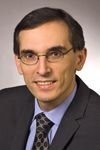Prof. Dr. Sandro WIMBERGER
PD Dr. Sandro WIMBERGER
Image: PrivateSandro Wimberger (PD Dr., Senior Researcher), Dipartimento di Fisica e Science della Terra, Università di Parma, Italy, is visiting the Abbe Center of Photonics as ASP Visiting Professor in February 2015.
Born in 1974, he graduated from the Ludwig-Maximilians-University Munich in 2000 and was awarded one of the first binational German-Italian PhD degrees in 2004 from the University of Insubria (Como) and the Ludwig-Maximilians University Munich. From the start of his research until 2004 he was a member of the Max Planck Institute for the Physics of Complex Systems in Dresden. After his Postdoc as a Humboldt Fellow at Pisa University in the experimental group of Ennio Arimondo, he held a research position at Turin Politecnico and he was Leader of the Junior Research Group on Complex Dynamics in Quantum Systems at Heidelberg University, where he still keeps the status of a visiting professor and Privatdozent. Since 2014 he is senior researcher (tenure track) in Parma and on the editorial board of the interdisciplinary journal Fluctuation and Noise Letters. He organized several international conferences at Heidelberg and Parma (two of these as prize winner of, e.g., the Baden-Württemberg Academy of Sciences and Humanities).
Sandro Wimberger's research focuses on classical and quantum dynamical systems, see his recent textbook on Nonlinear Dynamics and Quantum Chaos (Springer 2014). Transport in classical and quantum systems with external driving, strong nonlinearties and/or interactions is his area of expertise, with applications in atomic physics, optics, atom and quantum optics. He has published about 80 peer-reviewed papers and collaborates with many experimental groups worldwide. From 2008 to 2012 he acted as an industry consultant on Nonlinear Light-Matter Interactions for the company Selex-Galileo in Italy. His scientific work has regularly been presented to a broad social audience in form of press releases and articles, two of his own articles in the interdisciplinary Ruperto Carola Research Magazine, and at events held for kids from kindergardens/schools and at the Heidelberg International Science Forum (IWH).
website of Wimberger's groupExternal link
Lecture: Stable Structure Formation and Non-Equilibrium Transport in Dissipative Optical Lattices
Time: February 18, 2015, 15:00
Place: IFTO seminar room, Helmholtzweg 4, 07743 Jena
Open many-body quantum systems have recently gained renewed interest in the context of quantum information science and quantum transport with biological clusters and ultracold atomic gases. Based on our recent mini-review [1], we present a series of results in diverse setups of ultracold bosons in a one-dimensional lattice. We rely on a master equation approach to describe the dissipative many-body quantum dynamics. We investigate the impact of opening a many-body quantum system on its dynamical evolution. We see how dissipation together with strong interparticle interaction can be used to actively create stable and coherent many-body structures. Furthermore, we study simple models for the non-equilibrium transport of interacting bosons across quantum-dot like potentials. Driven by the experimental advance in the implementation of such systems with ultracold atoms [2], we show how noise and coupling to lead-like channels can lead to complex particle transport.
[1] G. Kordas, D. Witthaut, and S. Wimberger, Non-equilibrium dynamics in dissipative Bose-Hubbard chains, Ann. Phys. (Berlin, 2015), DOI: 10.1002/andp.201400189, invited contribution to upcoming Special Issue on Complex Quantum Systems
[2] R. Labouvie, B. Santra, S. Heun, S. Wimberger, and H. Ott, Negative differential conductivity in an interacting quantum gas, arXiv:1411.5632
